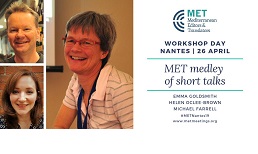Mediterranean Editors and Translators, 2019 Workshops, Nantes, France

Is full post-editing of machine translation output a pipe dream?
Comparison shows that certain turns of phrase, expressions and choices of words occur with greater frequency in post-edited machine translation output than they do in human translation. This implies that post-edited texts, on average, lack the variety and inventiveness of human translation, and any attempt to eliminate what are effectively machine translation markers would require additional post-editing effort and nullify most, if not all, of the time and cost-saving advantages. Of course variety and inventiveness are not always desirable features. Nevertheless, there are various kinds of text where homogenization and uniformity would make the translation less interesting to read and less intellectually stimulating. In such cases, failure to eradicate these markers may eventually lead to lexical impoverishment of the target language.
This talk will illustrate the risks involved in using post-edited machine translation output indiscriminately and put the translator in a position to explain when its use might be detrimental.
 Engaging copy translated literally into English, without taking account of differences in linguistic, semantic and cultural expressions, at best leaves much to be desired and at worst provokes hysterical laughter.
Engaging copy translated literally into English, without taking account of differences in linguistic, semantic and cultural expressions, at best leaves much to be desired and at worst provokes hysterical laughter.
 Thanks to my scientific background, I specialize in technical translations. Over the years I have acquired experience in transcreating advertising copy and press releases primarily for the promotion of technology products.
Thanks to my scientific background, I specialize in technical translations. Over the years I have acquired experience in transcreating advertising copy and press releases primarily for the promotion of technology products.
 "I am very satisfied: Michael is extremely professional, serious, competent and precise. It is a pleasure to work with him."
"I am very satisfied: Michael is extremely professional, serious, competent and precise. It is a pleasure to work with him."